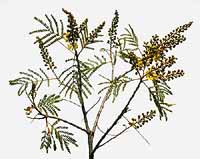| DESCRIPTION: It is a tree reaching 5-10 m in height, with a spreading crown, frequently branched from near the ground or 2- to 3-stemmed from ground level, bark smooth and grey on the young branches. Leaves alternate, compound, bipinnate, with 4-7 pairs of pinnae, each bearing 10-12 (or up to 23) pairs of feathery leaflets. USE: Young leaves, and especially the pods, are relished by cattle and goats. An important tree for beekeepers, as it is a good source of nectar and pollen. The wood is used as timber and fuel. The gum is reputed to be poisonous. Bark is chewed to relieve colic; an infusion, sometimes with leaves, is taken orally to relieve a variety of stomach disorders such as diarrhoea and dysentery and to get rid of intestinal parasites. Steam from a hot bark decoction is applied to sore eyes and, in serious cases, it is dropped into the eyes. The powdered decorticated root is applied to wounds to hasten healing, and a decoction is taken by mouth or gargled to treat sores in the throat. The roots are also boiled in water and used as an enema. Leaves are boiled and the steam directed into the mouth to relieve toothache. The tree is planted for shade, shelter and as a garden ornamental and along avenues. GROWING PERIOD: Perennial. COMMON NAMES: African wattle, Rhodesian black wattle, weeping wattle. FURTHER INF: It thrives in a wide range of climates, but does best in a hot, wet summer. It is a fast-growing, frost- and drought-resistant tree commonly occurring at medium to low altitudes, in wooded grassland and along marginal valleys. |
